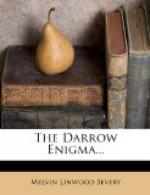“We must find someone,” I said, “who could have had a motive. This someone ought to have a particularly good reason for concealing his footprints, and is evidently lame besides. I can’t for the life of me see anything else we have to go by, unless it be the long nail of the little finger, and I don’t see how that is going to help us find the assassin—unless we can find out why it was worn long. If we knew that it might assist us. As I have already suggested, a Chinaman might have a long nail on the little finger, but he would also have the other nails long, wouldn’t he? Furthermore, he might use the boards to conceal the prints of his telltale foot-gear; but why should he not have put on shoes of the ordinary type? If he had time to prepare the boards,—the whole affair shows premeditation, —clearly he had time to change his boots. The Chinese are usually small, and this might easily account for the smallness of the hand as shown by your cast. These are the pros and cons of the only clue that suggests itself to me. By the way, Maitland, it’s a shame we did not try, before it was too late, to track this fellow down with a dog.”
“Ah,” he replied, “there is another little thing I have not told you. After you had left the house with Miss Darrow on the night of the murder, and all the servants had retired, I locked the parlour securely and quietly slipped out to look about a bit. As you know, the moon was very bright and any object moderately near was plainly visible. I went around to the eastern side of the house where the prints of the hand and boards were found, and examined them with extreme care. What I particularly wished to learn was the direction taken by the assassin as he left the house and the point at which he had removed the boards from his feet. The imprints of the boards were clearly discernible so far as the loose gravel extended, but beyond that nothing could be discovered. I sat down and pondered over the matter. I had about concluded to drive two nails into the heels of my boots to enable me to distinguish my own footprints from any other trail I might intersect, and then, starting with the house as a centre, to describe an involute about it in the hope of being able to detect some one or more points where my course crossed that of the assassin, when I remembered that my friend Burwell, whose Uncle Tom’s Cabin Combination recently stranded at Brockton was at home. As you are perhaps aware an Uncle Tom Company consists of a ‘Legree,’ one or two ‘Markses,’ one or two ‘Topsies,’ ‘Uncle Tom,’ a ‘Little Eva,’ who should not be over fifty years old,—or at least should not appear to be,—two bloodhounds, and anybody else that happens to be available. It really doesn’t make the least difference how many or how few people are in the cast. I have heard that an Uncle Tom manager on a Western circuit, most of whose company deserted him because the ‘ghost’ never walked, succeeded in cutting and rewriting the piece so as to double ‘George




